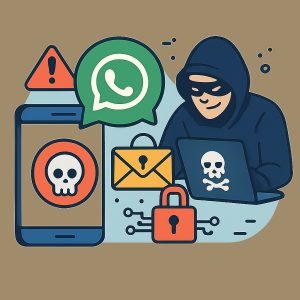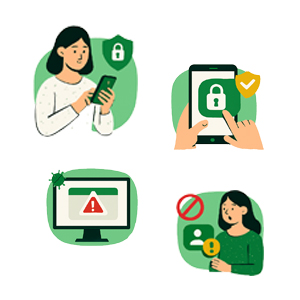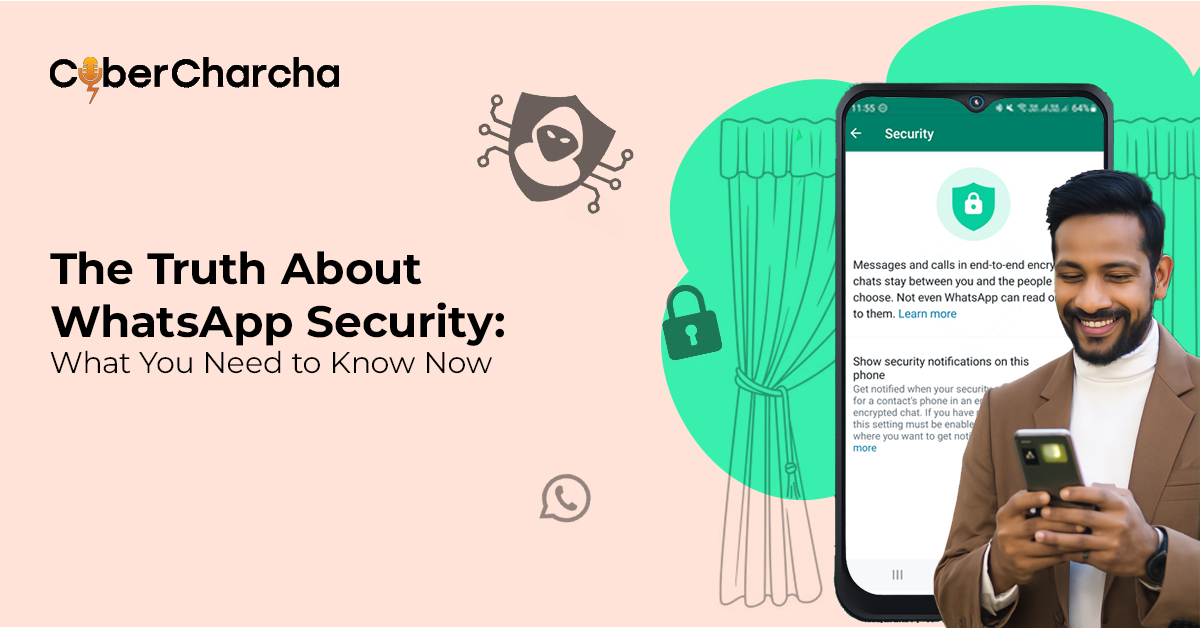WhatsApp is everywhere—from family chats to business dealings. It boasts more than 2 billion users and markets itself as a fortress for private communication, thanks to WhatsApp security via “end-to-end encryption.” But regular headlines about hacks and scams make many wonder: is WhatsApp really safe and secure as it claims? Should you be concerned? Here’s what we uncovered.
Inside WhatsApp’s Security Shield
At its core, WhatsApp’s end-to-end encryption means that only you and the intended recipient can read your messages. Each text, photo, call, and video is scrambled into unreadable code the moment you hit send, and only the recipient’s phone can unscramble it. Even WhatsApp itself can’t see the content.
On top of this, WhatsApp now lets users secure their backups stored on Google Drive or iCloud. There’s also an optional two-step verification PIN and the ability to lock the app with a fingerprint or face scan.
So, Why Do Hackers Still Succeed?
Despite these digital defenses, cybercriminals continue to break into accounts—sometimes without touching the encryption at all. Here’s how they breaches the WhatsApp security:
- First, there are social engineering scams. One popular tactic involves tricking users to reveal their WhatsApp verification code. If a hacker gets your code, they can hijack your account, lock you out, and message your contacts as you.

- Next is SIM swapping. In this scheme, a hacker convinces your mobile carrier to activate your number on a new SIM card they control. Once that happens, they can access your WhatsApp and many other services tied to your phone number.
- Then, there are advanced spyware attacks. Notorious tools like Pegasus can infect smartphones without users clicking anything. Once inside, these programs can spy on messages before they’re even encrypted—a threat most users aren’t likely to face, but it’s a chilling reminder that no app is completely “unhackable”.
- Another vulnerability is unprotected backups. If you haven’t turned on encrypted backups, your chat history in the cloud could be vulnerable—exposed to hackers who breach cloud storage accounts or obtained by authorities with a warrant.
- AndroRAT for android devices. Beyond these targeted attacks, a common threat to WhatsApp users comes from malware like AndroRAT (Android Remote Administration Tool). AndroRAT is a malicious program hackers hide inside seemingly harmless apps. Once installed, it gives attackers full remote control of your Android phone.
How Does This Affect WhatsApp Security?
AndroRAT can access everything on your phone—including WhatsApp data—by doing things like capturing your screen, reading notifications, recording audio, or even stealing stored WhatsApp chat files if your phone is rooted. It exploits Android system features to read whatever appears on your screen or stored in your device, bypassing WhatsApp’s encryption protections at the app level because the malware controls the device itself.
This means even if WhatsApp is very secure, your phone’s security matters just as much. If malware controls your device, it can spy on all your apps, including WhatsApp.
Finally, while WhatsApp can’t read your chats, it does gather meta who you talk to, when, and how often. While this isn’t message content, it paints a detailed picture of your social life.
What Can You Do To Stay Safe?
Great security isn’t just about technology—it’s also about habits. Here’s WhatsApp safety tips every user should follow in 2025:
- Turn on two-step verification to add a PIN that prevents account takeovers—even if someone gets your SIM or verification code.
- Be stingy with codes. Never, ever share your WhatsApp verification code, even with someone claiming to be a friend or WhatsApp support.

- Control your privacy by limiting who sees your last seen, profile photo, and about information in WhatsApp privacy
- Encrypt your backups by going to Settings > Chats > Chat Backup > End-to-End Encrypted Backup, and follow the prompts to secure your stored chats.
- Keep your app and your phone’s operating system updated to get the latest WhatsApp security updates.
- Check linked devices regularly by reviewing which devices are logged into your WhatsApp (Settings > Linked Devices) and signing out any you don’t recognize.
- Lock your phone and WhatsApp by using a strong phone password, enabling biometric authentication, and setting app-lock features if available.
- Be wary in groups and avoid accepting group invites from people you don’t trust—scammers use groups to target new victims.
- Only install from the official Apps Google Play Store, not third-party stores or links. Be wary of apps requesting excessive permissions (especially for accessibility, SMS, contacts, recordings, etc.). Although iPhones are considered much safer for these intrusions.
If You Get Hacked
Act fast by logging out all linked devices, resetting your WhatsApp two-step verification PIN, and alerting friends and family not to trust suspicious messages from your account. For suspected spyware infections, update your device, run a trusted antivirus scan, or consider a full reset.
Good to Remember
WhatsApp security is strong for an average person—if, and only if, you use its best security features. No platform is immune in spotting WhatsApp scams or state-level hacking tools, but by taking a few minutes with your settings and following smart habits, you can make your personal information and conversations much safer.
So—WhatsApp is safe, but only as safe as the settings you choose and the caution you practice. In today’s digital world, it pays to think before you tap.
About Cyber CharchaTM
Channel Technologies recently launched CT Cyber CharchaTM — a brand-agnostic platform dedicated to thought leadership in emerging technologies like cybersecurity, AI, digital transformation, blockchain, and more. We launched this brand earlier this year (Feb 2025) with a hybrid conference in IIT Delhi. The event was a huge success, and we had some great industry leaders as speakers and participants from the cybersecurity domain.
Under this, we have some other initiatives like conferences, webinars, Cyber Charcha Shots (a bite-sized video series featuring industry experts), and the newest, guest blogging.
Till now, we have brought together industry leaders from Microsoft, EY, Paytm, Grant Thornton Bharat LLP, Accenture, Marks and Spencer, and many more.
For more details visit Cyber CharchaTM
FAQs
How secure is WhatsApp's core messaging, and what does "end-to-end encryption" mean?
WhatsApp's core messaging offers strong security through "end-to-end encryption." This means that every message, photo, call, and video is scrambled into an unreadable code the moment it's sent and can only be unscrambled by the intended recipient's phone. Neither WhatsApp itself nor anyone else can read the content of these communications.
If WhatsApp uses end-to-end encryption, how are accounts still being compromised by hackers?
Despite its strong encryption, WhatsApp accounts can still be compromised through various methods that often bypass the encryption itself. These include social engineering scams, where users are tricked into revealing their verification codes; SIM swapping, where hackers gain control of a user's phone number; and in rarer cases, advanced spyware attacks like Pegasus that infect the device before messages are encrypted. Additionally, unencrypted cloud backups can be vulnerable, and WhatsApp collects metadata (who you talk to, when, how often) even if it can't read message content.
What are some common social engineering tactics used to gain access to WhatsApp accounts?
One popular social engineering tactic involves tricking users into revealing their WhatsApp verification code. If a hacker obtains this code, they can hijack the account, lock the legitimate user out, and send messages to their contacts masquerading as them. This highlights the importance of never sharing your verification code with anyone, regardless of who they claim to be.
How can SIM swapping pose a threat to WhatsApp security, and what other services are affected?
SIM swapping is a scheme where a hacker convinces your mobile carrier to activate your phone number on a new SIM card they control. Once they have control of your number, they can access your WhatsApp account and many other services tied to that phone number, making it a significant security risk.
What measures can users take to significantly enhance their WhatsApp security?
Users can significantly enhance their WhatsApp security by activating two-step verification with a PIN, never sharing their WhatsApp verification code, controlling privacy settings (like "last seen" and profile photo visibility), encrypting chat backups, keeping the app and phone operating system updated, regularly checking linked devices, using strong phone passwords and biometric authentication, and being cautious about accepting group invites from unknown sources.
Why is enabling two-step verification crucial for WhatsApp security?
Enabling two-step verification is crucial because it adds an extra layer of security with a PIN that prevents account takeovers. Even if a hacker manages to obtain your SIM card or verification code, they would still need this PIN to access your account, providing a strong defense against unauthorized access.
What is the risk associated with unencrypted cloud backups of WhatsApp chats?
If you haven't turned on WhatsApp encrypted messages backups, your chat history stored in cloud services like Google Drive or iCloud could be vulnerable. This means that if hackers manage to breach your cloud storage account, or if authorities obtain a warrant, they could potentially access your unencrypted chat history, even though the messages themselves were end-to-end encrypted when sent.
What should a user do immediately if they suspect their WhatsApp account has been hacked?
If a user suspects their WhatsApp account has been hacked, they should act fast by logging out all linked devices, resetting their two-step verification PIN, and alerting friends and family not to trust any suspicious messages coming from their account. For suspected spyware infections, updating the device, running a trusted antivirus scan, or considering a full factory reset is recommended.
What Exactly is AndroRAT?
AndroRAT is a type of malicious program, or malware, designed to grant attackers comprehensive remote control over an Android phone. It's particularly insidious because hackers often hide it inside seemingly harmless apps. Once an unsuspecting user installs one of these compromised apps, AndroRAT then takes root on their device, giving the attacker extensive access and control.
How Does AndroRAT Compromise WhatsApp?
While WhatsApp's core security mechanism ensures that "only you and the intended recipient can read your messages" and that "Even WhatsApp itself can’t see the content", AndroRAT operates at a deeper level. It exploits the fact that it controls the entire Android device, not just the WhatsApp application.
This allows it to:
- Access everything on your phone, including WhatsApp data
- Capture your screen, enabling it to read any information that appears on your display. This means it can spy on your conversations "before they’re even encrypted" as you type them, or after they are decrypted and displayed on your screen
- Read notifications that appear on your device
- Record audio
- Steal stored WhatsApp chat files, especially if your phone has been "rooted"
This highlights a critical point: if malware like AndroRAT has control over your device, it can effectively "spy on all your apps, including WhatsApp", thereby bypassing the app’s encryption protections because the malware directly controls the device itself.




